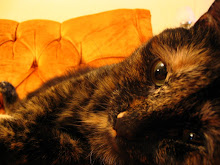He was a good kid. Smarter than the grown-ups, unafraid of bullies, and his best friend was a girl. Actually, I forgot that his best friend was a girl till I re-read one of the books last night. The mysteries hold up well (and I even remembered some of the solutions - not solved, but remembered from when I was nine or twelveor whatever). The dialogue is a little dated, but that's a positive rather than a negative. The metaphors are funny; the sarcasm child-like and not obnoxious.
This part shocked me however:
On Tuesday, business was slow all morning till Elmo Thomas came in.Sure, as children, we often feel our parents' decisions are unfair, but Encyclopedia's defence of parents and grown-ups in general is so rare, that it made me pause and re-read the dialogue - and notice how mild Elmo's complaint is. (Compare it to the way child 'sass' has been depicted in books, tv shows, and film since the 80s).
"Mothers," he grumbled. "They don't understand kids."
"That's no way to talk," protested Encyclopedia.
Philip Pullman has said that it's easiest to write a kid's story with an orphan as the protagonist, because parents just get in the way. I think he's right, and it's something that most writers intuit quite quickly (unless the parents are part of the story, or must be there to provide a safe haven for the end). When a child is the hero of the story, parents are usually absent (negligent/deceased/ill/in a parallel world):
- Sarah in "A Little Princess" - orphan
- Mary in "The Secret Garden" - orphan
- Lyra in "The Golden Compass" - orphan in the sense that her parents are not her guardians nor are they known to her
- Will in "The Subtle Knife" - only child to an ill single mother and long-lost father - in modern child psychology, Will would be considered "parentified"
- Huckleberry Finn - under guardianship of Widow Douglas and then later escaping a neglectful alcoholic father
- Harry Potter - perhaps the most famous children's lit orphan of our time
- Pippi Longstockings - living alone with her horse and her monkey; father lost at sea
I guess I'm so familiar with a children's lit character having no parents, that I found Encyclopedia's respect for grown-ups incredibly sweet and startling.
The Encyclopedia Brown books are written by Donald J. Sobol and have been in print since the late '60s.
Addendum: How did I forget Oliver Twist?!


No comments:
Post a Comment